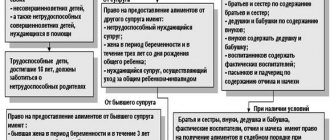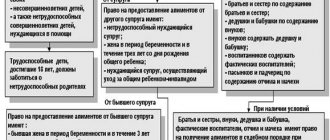Regulatory regulation of the issue of alimony for spousal support
Let's consider two possible situations encountered in practice. Your own situation will fall under one of the situations I described below, with slight variations.
Situation No. 1.
The wife and husband are married. During the marriage, the couple had a child. Three months later, the husband left the family. He gives money only for the maintenance of the child; he does not pay alimony to his wife. The child is seven months old. My wife doesn't work.
In this situation, is the husband obliged to pay alimony for the maintenance of his wife?
In accordance with paragraph 1 of Article 89 of the Family Code of the Russian Federation
spouses are obliged to financially support each other.
According to paragraph 2 of Article 89 of the Family Code of the Russian Federation
in the event of refusal of such support and the absence of an agreement between the spouses on the payment of alimony, the wife has the right to demand the provision of alimony in court from the other spouse who has the necessary means for this during pregnancy and for three years from the date of birth of the common child.
Thus, the husband is obliged to financially support his needy wife on a voluntary basis, providing funds for the maintenance of his wife. In case of refusal, the wife has the right to demand alimony from her husband for the maintenance of the spouse by filing a claim for maintenance of the spouse with the court for this purpose.
The obligation of spouses to provide mutual financial support to each other arises from the moment of marriage. The state of actual marital relations in the absence of an officially registered marriage does not give the right to demand the provision of appropriate material support.
Situation No. 2.
During the marriage, the couple had a child. Two months later, the couple divorced.
Is the husband obliged in this situation to provide maintenance for his ex-wife?
In accordance with paragraph 1 of Article 90 of the Family Code of the Russian Federation
The ex-wife has the right to demand alimony in court from a former spouse who has the necessary means for this during pregnancy and for three years from the date of birth of their common child.
The Family Code contains, as a direct condition for one spouse to receive alimony from the other, an indication of the latter’s financial ability to pay it.
This means that the payment of alimony by the obligated person should not lead to a significant decrease in the level of his well-being, an approximate criterion of which is the subsistence level.
Alimony for the maintenance of a former spouse can be collected by the court during pregnancy and within three years from the date of birth of a common child.
To do this, a claim is filed with the court for spousal maintenance. A mandatory requirement for the court to satisfy a claim for spousal support is that the defendant spouse has the necessary funds for this.
The amount of alimony collected for the maintenance of a spouse (former spouse) is determined in a fixed amount:
- a multiple of the cost of living;
- as a share of the cost of living.
This procedure for determining the amount of alimony is established in order to protect the rights of the spouse from inflation, since in accordance with paragraph 1 of Article 117 of the Family Code of the Russian Federation, alimony to the spouse can be indexed.
At the same time, the size of the subsistence minimum is determined by the value established for the socio-demographic group of the population “working-age population”.
A spouse who is on parental leave to care for a child under 3 years of age is not considered disabled.
Minimum amount of alimony
Unfortunately, the minimum amount of alimony is not defined by law. If for child support at least a percentage of the income to be paid is established, then in the case of the ex-wife this is not specified either.
For reference: We have examined in detail the amounts of alimony for two children and children after 18 years of age. Check out these materials.
In each lawsuit, the amount is determined individually, based on the income of the former spouses. As a rule, if the husband is already obligated to pay child support, or is paying off a loan taken out during the marriage, or is bearing the burden of other expenses that arose while the spouses were running a common household, this is taken into account by the court.
If alimony is assigned to your ex-wife, it must be paid in a fixed amount monthly.
Grounds for collecting alimony for spousal support
The only legal basis for collecting alimony for spousal support is the presence of a dependent minor child under the age of 3 years by the spouse (former spouse).
I draw your attention to the fact that the right of a wife during pregnancy and for three years from the date of birth of a common child to receive alimony from her husband is not made dependent on her disability and need.
For the right to alimony to arise, it does not matter whether the wife works during pregnancy and for three years after the birth of the child or devotes herself entirely to caring for the child.
The main condition for the emergence of a wife’s right to receive alimony during pregnancy and in connection with the birth of a child is the bearing and birth of a common child.
The law proceeds from the fact that during this period a woman needs rest, special nutrition, treatment, etc.
All material costs associated with bearing and caring for a common child must be borne equally by both spouses, even if the wife is financially secure.
Based on my own judicial practice, I will say that courts often indicate in a decision that the wife needs financial assistance, does not work and does not intend to work during the entire period of child care.
At the same time, the question of the degree of need of the wife for material assistance has important legal significance for determining the amount of alimony for the maintenance of the spouse (former spouse).
Resolving the issue of the amount of alimony, the magistrate determined its amount, bearing in mind that due to being busy caring for a common child until he reaches the age of three, the child’s mother does not have the opportunity to work and receive wages that ensure her own maintenance, and therefore are subject to recovery in her favor, alimony must be of a real nature (Appeal ruling of the Lysvensky City Court of the Perm Territory dated November 27, 2015 in case No. 11-65/2015).
If the wife does not have her own funds, alimony for the maintenance of her spouse (former spouse) must be collected in an amount sufficient to satisfy her basic living needs and to cover special additional expenses associated with pregnancy and childbirth.
If she has her own funds, alimony for the maintenance of her spouse (ex-wife) should be sufficient only to cover these expenses.
The magistrate rightfully took into account that the plaintiff currently does not have the opportunity to find a job because she is busy caring for a small child.
However, the appellate court does not agree with the conclusions of the magistrate regarding the amount of money collected, since the legal norms regulating the legal relations that have arisen provide for the obligation of the spouses to financially support each other, and not support each other in full, while the amounts recovered in favor of the plaintiff are aimed at her full monthly maintenance (Appeal ruling of the Pushkin City Court of the Moscow Region dated November 11, 2014 in case No. 11-97/2014).
Amount of monthly payments during maternity leave
Monetary support for the wife during maternity leave.
In contrast to the monthly payments of a parent to a minor, the spouse pays maintenance to his wife during maternity leave only if there is a fact of need or voluntarily.
Alimony obligations towards a spouse can also be established during marriage. To do this, the plaintiff must prove that the money allocated by the defendant for living is insufficient.
The laws do not clearly define the term “need”. In this connection, this decision falls within the competence of the court. That is, when considering, the judge must individually find out whether the mother really needs it.
It is quite possible that the plaintiff is pursuing personal selfish goals, for example, trying to take revenge on her ex for personal past grievances. Also, the judicial authority decides on the amount of alimony in each specific case.
In addition, the following points are taken into account:
- the amount of all benefits received by the applicant;
- availability of additional sources of profit;
- need for treatment;
- the potential payer has other dependents;
- payment of alimony payments by the defendant to other persons.
Grounds for exemption from paying alimony for spousal support
The grounds for exemption from paying alimony for the maintenance of a spouse (former spouse) can only be:
- the child reaches 3 years of age,
- or such a change in the financial or marital status of the parties that would deprive the alimony payer of the ability to pay them,
- or the recipient of alimony has a complete lack of need for it.
In this case, the presence of a set of specified conditions is not required. It is enough to have at least one of them.
The obligation to provide maintenance to a spouse for up to 3 years rests with the other spouse only if he himself has the necessary means to pay alimony. I already wrote about this above in my article.
The availability of the necessary funds is understood as such a level of security for the spouse at which, after paying alimony, he himself will remain provided with funds in the amount of at least the subsistence level.
The availability of the necessary funds is determined by the court, taking into account all the circumstances of a particular case (see the Appeal ruling of the Motovilikha District Court of Perm dated 12/09/2015 in case No. 11-312/2015, the Appeal ruling of the Judicial Collegium for Civil Cases of the Omsk Regional Court dated 09/07/2016 . in case No. 33-9018/2016).
The court has the right, in the presence of special circumstances, to consider that the spouse does not have the necessary funds, even if after paying alimony he will still have funds in the amount of the subsistence minimum, for example, if the paying spouse, for health reasons, needs significant funds for treatment, etc.
I would like to immediately draw your attention to the fact that the grounds for releasing a spouse from the obligation to support another spouse, provided for in Article 92 of the Family Code of the Russian Federation, are not applicable in this case.
Article 92 of the Family Code of the Russian Federation talks about cases where a spouse is released from the obligation to support another disabled spouse in need of help.
Based on the provisions of Articles 89 and 92 of the Family Code of the Russian Federation in their interrelation, the grounds listed in Article 92 of the Family Code of the Russian Federation are not legally significant circumstances in disputes regarding the collection of alimony for the maintenance of a spouse (former spouse) until the child reaches the age of 3 years, because Article 92 The Family Code of the Russian Federation is not applicable to controversial legal relations, since the plaintiff belongs to a different category of persons who have the right to demand alimony (wife during pregnancy and for three years from the date of birth of their common child).
In other words, a wife during pregnancy and for three years from the date of birth of a common child is not considered an incapacitated needy spouse.
Okay, let's leave the article. 92 of the Family Code of the Russian Federation alone. I hope you have clearly understood that in cases of alimony for spousal support, it is not applicable.
At the same time, there is another interesting provision in the Family Code of the Russian Federation, namely, paragraph 2 of Article 119:
The court has the right to refuse to collect alimony from an adult capable person if it is established that he has committed an intentional crime against the person obligated to pay alimony or in the event of unworthy behavior of an adult capable person in the family.
Here's a real example. The wife cheated on her husband, the husband filed for divorce, the couple divorced. Subsequently, the wife filed a claim in court for spousal support.
Will the fact of treason affect the court's decision and how can this be proven? I believe that in court the ex-wife is unlikely to confirm the fact of infidelity.
The very fact of treason will be almost impossible to prove in court. Only if you don’t bring witnesses or provide a video recording, but in such cases, often, there is neither one nor the other.
At the same time, the burden of proving the immorality of your ex-wife’s behavior will fall on you, and accordingly, you will have to prove the fact of infidelity.
If you manage to do this, then you will have every chance of being exempt from paying alimony for the maintenance of your ex-wife.
Or here’s another interesting situation that also occurs in my practice.
My ex-husband is on parental leave. In this case, does the ex-wife have the right to demand alimony for her maintenance until the child reaches the age of 3 years?
To answer this question, you need to once again familiarize yourself with the contents of paragraph 2 of Article 89 of the Family Code of the Russian Federation and paragraph 1 of Art. 90 of the Family Code of the Russian Federation.
It states that the wife has the right to demand alimony - regardless of who works and who is on parental leave and actually takes care of him.
Therefore, my answer to the question whether the wife has the right to demand alimony for herself, despite the fact that the husband (ex-husband), and not she, is on parental leave, will be in the affirmative.
Why? Because in this case, alimony is collected not for the maintenance of the child, but for the maintenance of the wife after childbirth.
These alimony payments are in no way connected with child care, since the above-mentioned articles of the Family Code of the Russian Federation do not make the right to receive alimony dependent on where the child is and whether he is even alive or not.
For an ex-husband, in such a case there are provisions in Chapter 13 of the Family Code of the Russian Federation.
It's quite simple. If the father maintains the child, he has the right to demand alimony from the child’s mother - and there are quite a lot of such decisions.
Financial support for a spouse after divorce
The court has the right to oblige one spouse to provide financial support to the other. Moreover, such payments do not depend on the presence of joint heirs or their age. In addition to the above-mentioned reasons, the reason for receiving alimony amounts after the dissolution of marriage is the following that arose during the year:
- the plaintiff's disability;
- difficult financial situation.
When resolving a dispute, the duration of the marriage is important to the court. The law does not say anything about what kind of marriage is considered long-term. Therefore, the answer to this question was given by judicial practice. A sufficient period of time to receive financial support is ten years of family life. At the same time, the approach to each case must be individual.
The legislation also defines the grounds, in the presence of which, the defendant should not pay spousal support. These include:
- abuse of alcohol or narcotic or psychotropic drugs, if this led to the plaintiff’s incapacity for work;
- the applicant has committed a crime;
- neglect of one’s responsibilities during marriage to one’s spouse and children.
The wife received alimony and now got a job. Advice for alimony payers
As a matter of fact, I included this section in the article not by chance.
This life situation occurs quite often in practice.
Here's an example.
A man named Yuri sought legal advice from a certain lawyer Alexander from Moscow.
The situation itself and the lawyer’s response are outlined
Here
Pay attention to what I highlighted in the brown fill.
By the phrase “you cannot file for cancellation of alimony,” the lawyer means that you do not have the right to file a claim for exemption from paying alimony.
Is it really? Let's figure it out. Here is an example from judicial practice.
Appeal ruling of the Central District Court of Chita dated February 1, 2016. in case No. 11-23/2016
Plaintiff Krivorog I.S.
turned to Meltsaeva O.M. with a claim to terminate the collection of alimony for the maintenance of a spouse. The magistrate decided to satisfy the claims of I.S. Krivorog. Disagreeing with the decision of the magistrate, Meltsaeva O.M. filed an appeal.The child was under three years of age at the time of consideration of the case. Resolving demands for the release of Krivorog I.S. from paying alimony for the maintenance of the spouse, the magistrate proceeded from the fact that the defendant did not need alimony since she had started work.
The appellate court cannot agree with this conclusion, since the basis for collecting alimony in this case was the presence of O.M. Meltsaeva. dependent on a minor child under the age of 3 years and the basis for exemption from paying alimony can only be the child reaching 3 years of age, or such a change in the financial or marital status of the parties that would make it impossible for the payer of alimony to pay them, or the complete absence of the recipient of alimony in their need.
Thus, the magistrate incorrectly applied the rule of substantive law, and also incorrectly determined the circumstances relevant to the case, and therefore the decision is subject to cancellation with the issuance of a new decision, which, in satisfying the demands of the plaintiff Krivorog I.S. should be refused.
Thus, it turns out that if your spouse (ex-wife) went to work, this is not a basis for exempting you from paying alimony for her maintenance until the child reaches the age of 3 years.
Indeed, the mere fact that your spouse (ex-wife) goes to work does not have any legal significance for the issue of exempting you from paying alimony for her maintenance.
At the same time, according to paragraph 2 of Article 120 of the Family Code of the Russian Federation
The payment of alimony collected in court is terminated: - when the court recognizes the restoration of working capacity or the cessation of the need for assistance of the alimony recipient; - when a disabled ex-spouse who is the recipient of alimony enters into a new marriage;
Article 120 of the Family Code of the Russian Federation provides grounds for exemption from alimony payments if the court recognizes the restoration of working capacity or the cessation of the need for help by the alimony recipient.
But an ex-spouse caring for a child is not a disabled person.
Nowhere in the legislation of the Russian Federation does it directly state that a woman who is pregnant and/or on maternity leave for a child under three years of age is disabled.
Therefore, if you want to stop paying alimony for the maintenance of a spouse for up to 3 years, you need to prove in court not the fact that the spouse went to work, became able to work, etc., but you need to prove the fact that the spouse no longer needs material help from you.
For these purposes, you can file a petition in court to request information from the ex-wife’s employer about the amount of wages.
It is important to understand that the release or termination of payment of alimony for the maintenance of a spouse (former spouse) in a situation where the child has not yet reached the age of 3 years, contrary to the example from judicial practice I gave above, is possible in two cases:
A) if you prove that your spouse (former spouse) is no longer a person in need.
According to the Determination of the Constitutional Court of the Russian Federation dated April 22, 2010 N 546-О-О
the obligation to pay alimony for the maintenance of a former spouse can be imposed by the court only on persons who have the necessary means for this.
According to the Determination of the Constitutional Court of the Russian Federation dated October 23, 2014 N 2463-O
The need of a spouse is determined by the court in a specific case by correlating his income with the expenses necessary to satisfy his vital needs, as well as taking into account other circumstances.
According to the Determination of the Constitutional Court of the Russian Federation dated July 17, 2012 N 1366-O
In itself, paragraph four of paragraph 2 of Article 120 of the Family Code of the Russian Federation, according to which the payment of alimony collected in court is terminated when the court recognizes the restoration of working capacity or the cessation of the need for help of the recipient of alimony, in a systematic relationship with paragraph 1 of Article 119 of the same Code on the right of the court, at the request of any of the parties to the alimony obligation, to change the amount of alimony established by the court in the event of a change in the financial or marital status of one of the parties or if one of the parties has another noteworthy interest, aimed at ensuring a balance of interests of the parties to such an obligation.
From the above-cited Determination of the Constitutional Court of the Russian Federation, it is probably not entirely clear to you what kind of claim to bring against your spouse (ex-wife) - for exemption from paying alimony (Article 120 of the Family Code) or for a reduction in the amount of alimony (Article 119 of the Family Code) ?
From my own experience and based on my own judicial practice, I can say that if the income of a spouse (former spouse) is more than the subsistence level, then she can no longer be recognized as needy.
Accordingly, you have grounds for filing a claim specifically for exemption from paying alimony, since this is directly provided for in Article 120 of the Family Code of the Russian Federation.
In this sense, the lawyer who advised Yuri in the example above was wrong when he wrote that Yuri could not apply for alimony cancellation.
If the income of your spouse (former spouse) turns out to be less than the subsistence level, then in this case you can ask the court not for exemption from paying alimony, but only for a reduction in the amount of alimony.
And you will need to base your claim not on Article 120, but on Article 119 of the Family Code of the Russian Federation.
In both cases, the main thing for you to prove is how much the financial situation of the parties has changed and how the amount of alimony now relates to the income of the spouse (former spouse).
B) if you prove that your financial or family situation has changed so much that you are no longer able to pay alimony at the same level.
The process of proof in this case is similar to the process of proof in cases of reducing the amount of alimony.
Conditions for terminating spousal support payments
In addition to the grounds for spouses to receive financial support, the law provides for conditions for terminating such payments. So, payments end if:
- The baby's mother has finished her maternity leave;
- the minor is three years old;
- restoration of the alimony recipient's ability to work;
- changes in the financial situation of one or both parties;
- the claimant enters into a new marriage;
- death of the payer or recipient.
The parties can independently agree to terminate payments. There are situations when the spouse receiving alimony entered into a new marriage, but did not notify the alimony provider about this and continued to receive payments.
In this case, all illegally obtained funds should be returned to the payer. If a voluntary return is refused, the interested person has the right to seek protection of his rights in court. In this case, the alimony agreement will become one of the main pieces of evidence. The judge will constantly refer to it during the trial.
Alimony for spousal support: procedural issues
When a wife (ex-wife) files a claim for alimony for her maintenance during pregnancy, the husband cannot file a counterclaim to challenge his paternity, since this is possible only after the birth of the child in connection with the challenge of the paternity record.
However, the husband has the right to present indisputable evidence that his wife (ex-wife) is not pregnant with his child, for example, a medical certificate stating that for medical reasons he cannot have children, etc.
The courts must examine such evidence, and if there is indisputable evidence that the child being carried by the spouse (ex-wife) is not common, the claim should, in theory, be denied.
Why in theory? But because some of our courts sometimes allow a different interpretation, based on the fact that Art. 89 of the Family Code of the Russian Federation does not contain wording that the wife must be pregnant with a common child, and they do not attach legal significance to such evidence, satisfying the demands of the spouse (former spouse) with reference to the fact that she is pregnant.
This interpretation of the commented article took place in the decision of one of the courts in the city of Guryevsk, Kemerovo region.
The court there expressly stated that a wife during pregnancy has the right to receive maintenance from her husband, regardless of whether she is pregnant from her husband or from another person.
If the claim is brought after the birth of the child, the defendant has the right to file a counterclaim to challenge the record of paternity.
If during the proceedings of this case it is established that the defendant is not the father of the child, then this circumstance in itself does not provide grounds for the return of alimony received by the plaintiff during pregnancy.
To do this, it is necessary to prove that the plaintiff knew for sure that she was pregnant not from the defendant, and submitted false documents to the court or provided false information.
A claim for the recovery of alimony for the period of pregnancy can be brought from the moment this fact is established and confirmed by medical documents.
The spouse (former spouse) has the right to file a claim for the recovery of alimony simultaneously for the period of pregnancy and a three-year period after the birth of the child.
Otherwise, she loses a significant part of the funds for her maintenance, since immediately after the birth of the child she cannot go to court with a new claim for obvious reasons, and alimony is awarded from the day the claim is filed.
In the event of termination of pregnancy or stillbirth, the defendant has the right to demand termination of alimony payments.
Alimony for the maintenance of a wife can be collected by the court from the moment she becomes pregnant until the expiration of three years from the date of birth of the common child.
The plaintiff in cases of recovery of alimony for the maintenance of a spouse (former spouse) is:
- ex-wife, if the marriage was dissolved during her pregnancy, and the claim was filed during pregnancy or within three years after the birth of a common child;
- wife (ex-wife) in the event of the birth of a common child before the divorce;
- wife (ex-wife) in the event of the birth of a common child after divorce, if the father of the child is the ex-husband.
At the same time, the ex-husband is assumed to be the father of the ex-wife’s child - if the child was born within 300 days from the date of divorce (clause 2 of Article 48 of the Family Code of the Russian Federation).
The defendant in cases of recovery of alimony for the maintenance of a spouse (ex-wife) is the husband (ex-husband).
Supporting a Spouse with a Disability
A husband or wife with a disability has the right to make demands for financial assistance from their spouse, including their ex. The key point is not only the presence of disability, but also the fact of need.
During the trial, the following circumstances are revealed:
- the amount of all funds (salaries, benefits, rewards) received by the applicant and the respondent;
- frequency of payments received;
- the amount of monthly mandatory expenses of the parties, etc.
That is, if a disabled person is an entrepreneur or has a high salary, then the chances of satisfying alimony claims are extremely low.
Which court to file a claim for spousal support?
The spouse (former spouse), acting as the plaintiff, files a claim for her maintenance until the child reaches the age of 3 years in the district court.
I wrote about this in detail in my other article in the section “Which court should I go to when filing alimony for a disabled spouse?”
In the same article, in the corresponding section, you can easily find information about the state duty for filing a statement of claim.
And I won’t repeat myself here.
Alimony for a spouse of pre-retirement age or a pensioner
The right of a spouse of pre-retirement age or a pensioner to alimony.
The legal norm on financial support for pensioners has been contained in the Family Code for a long time. However, after raising the retirement age in the country, discrepancies arose in the legislation.
In this regard, changes were made to the above-mentioned Code in the spring of 2021. Thanks to them, the problems and contradictions that arose were eliminated. Thus, the right of able-bodied persons of pre-retirement age to monetary support has been determined.
Accordingly, in addition to disabled people, the following have the right to file claims for the assignment of monthly payments:
- women over 55 years of age;
- men over 60 years of age;
- pensioners.
The first step to obtain financial support is to file a claim at the place of registration of the defendant. Spouses may not involve the judicial authority in the dispute. Many negotiate on their own. The consequence of such negotiations is the conclusion of an appropriate agreement. This document must be certified by a notary after signing.
Claim for spousal support
In this section of the article I present to your attention my sample application for spousal support.
I am showing it to you only in terms of volume. This claim for spousal support is 100% effective and has been perfected over the years of my judicial practice.
The texts and wording that I used in this lawsuit are hidden from reading. The logic here is simple: thoughtlessly copying wording from someone else’s claim will not lead to anything good.
If you need a professionally drafted claim for the recovery of alimony for the maintenance of your spouse (ex-wife), taking into account your specific situation - contact me, I will draw up the best claim for you.
+7
Many wives (ex-wives) believe that cases for the collection of alimony for spousal support are winning.
Nothing like this if a professional works on the defendant’s side. Further, using one of the examples, you will clearly see how important it is to enlist the support of a professional in this matter, instead of using crooked claim templates scattered on the Internet. So, read on.
Required Criteria
After the divorce of spouses, parents are obliged to provide a decent standard of living for their common children. If the family is not financially secure, and other criteria specified in the law are present, then alimony is also due to the spouse. A parent who has left the family must take care of a decent standard of living for the former family.
Such a formulation of the question is often not welcomed by ex-husbands, but a court ruling is always made in favor of the woman if she provides evidence that she needs financial support.
In 2021, the following conditions must be met:
- The parent who demands the recovery of alimony must have documents confirming the facts stated in the claim: pregnancy, income level, disability, etc.
- The spouse who applies for alimony must have a marriage certificate, that is, a civil marriage is not the basis for the opportunity to receive alimony.
Alimony for the ex-wife is assigned on an individual basis. If, in relation to payments to children, the law indicates the amount as a percentage of income, then in this case there must be an individual approach.
How can I find out the amount of alimony debt? The answer is presented in the article “Where lists of alimony debtors are available.” You can find out how alimony is withheld from sick leave here.
Example of an objection to a statement of claim
I will give one illustrative example of how I ruined the plaintiff’s plans to collect alimony for the maintenance of her ex-wife.
Vadim Nikolaevich approached me with a request to draw up an objection to the statement of claim of his ex-wife.
That's it
After reading the statement of claim, I prepared this:
You're probably anxious to find out what the judge ruled? Then look further.
How much can you expect?
The amount of alimony for a spouse is not fixed, it depends on the individual conditions of each individual case. The court assigns alimony at its discretion, having examined all the documents provided by the plaintiff. The maintenance is assigned in a fixed amount. Data that the court takes into account when determining the amount of payments:
- the amount of income of both parties;
- stability of employment and income;
- the presence of expensive expenses: loans, maintenance of dependent relatives, expensive treatment, etc.);
- other individual conditions that affect the financial situation of the parties.
When determining the amount, the court is based on the cost of living in the region.
After the court decision is issued, the payer can challenge the amount of alimony if it seems unaffordable to him. By providing evidence of real income to the court, you can achieve a reduction in the amount of payments.
Court decision in the case of collecting alimony for the maintenance of the ex-wife
Having studied the case materials, as well as the evidence presented in the case, the court made the following decision:
That's all.
The objections prepared by me helped the defendant win the dispute in the case of collecting alimony for the maintenance of his ex-wife.
If you are a defendant in the case, please contact me and I will help you draw up a competent objection to the statement of claim for the recovery of alimony for spousal support.
+7
Determining the amount of financial support for an ex-wife with a child under 3 years old
The law does not determine the amount or percentage of alimony for the wife of the defendant’s income. Until the child reaches the age of three, the mother has the right to receive alimony in a fixed amount.
The amount of the fixed sum of money will be determined by the court, based on the documents presented by both sides. Documents confirming the need for additional treatment, rehabilitation, and paid medical services will help increase your payment. Payments can be reduced by providing evidence of the defendant’s difficult financial situation, certificates of low earnings, or the presence of new dependents.
Main indicators that the judicial authority will evaluate:
- Financial situation of the plaintiff and defendant.
- Marital status (presence of another marriage).
- Additional factors influencing the amount of payments in a particular situation.
If the issue of monetary support is resolved peacefully, through an agreement of the parties, the amount can be any, but not less than the subsistence level in force in the region where the plaintiff lives.
There are no special restrictions for the judge when establishing the exact amount; only a comprehensive consideration of the parties’ arguments will make it possible to determine the number of subsistence minimums that the spouse can claim.
When local minimums do not apply in a region, the court proceeds from the federal value. Details about the assignment of alimony to the ex-wife before reaching the age of three are described in Art. 91 RF IC.
Unlike alimony for children under the age of majority, alimony for a former spouse is determined solely in the form of an exact amount. Linking to the cost of living will help avoid inflationary depreciation, since its size is directly related to total expenses in the region, based on price statistics and the cost of living.
To ensure that alimony payments are not disproportionate to the defendant’s actual income, the judge will require documents confirming earnings and employment in general. If the defendant does not agree with the plaintiff's demands, you need to know how to challenge the awarded amount. The alimony payer files a counterclaim with a request to reduce the amount of payments taking into account the difficult financial situation.
Read: How alimony is calculated if the husband does not officially work.
As documentary evidence, the second party submits the following supporting documents to the judge:
- Documents recording the birth of new children who are currently dependent on the defendant.
- The defendant has a serious illness, disability, and, as a consequence, a decrease in income.
- Assignment of a disability group that does not allow high earnings.
The final amount determined by the court depends on the convincingness of the arguments. After the decision is made, a writ of execution is prepared, which is then submitted for execution to the employer or FSSP employee. The bailiff, having received a court order for execution, will organize the process of transferring funds, collecting from the alimony payer, and if alimony payments are evaded, he will take restrictive measures, including the seizure of property and blocking of bank accounts.
Suspension of funds transfer
The law provides that the payment of alimony may be suspended or terminated under certain conditions:
- end of parental leave;
- official marriage of the ex-wife;
- the death of one of the parties.
Cases when the amount of payments is reduced or terminated at the request of the payer:
- the disability of the alimony recipient was due to alcohol abuse;
- been married for less than 1 year;
- inappropriate behavior of a woman: drunkenness, child abuse, committing criminal acts.









